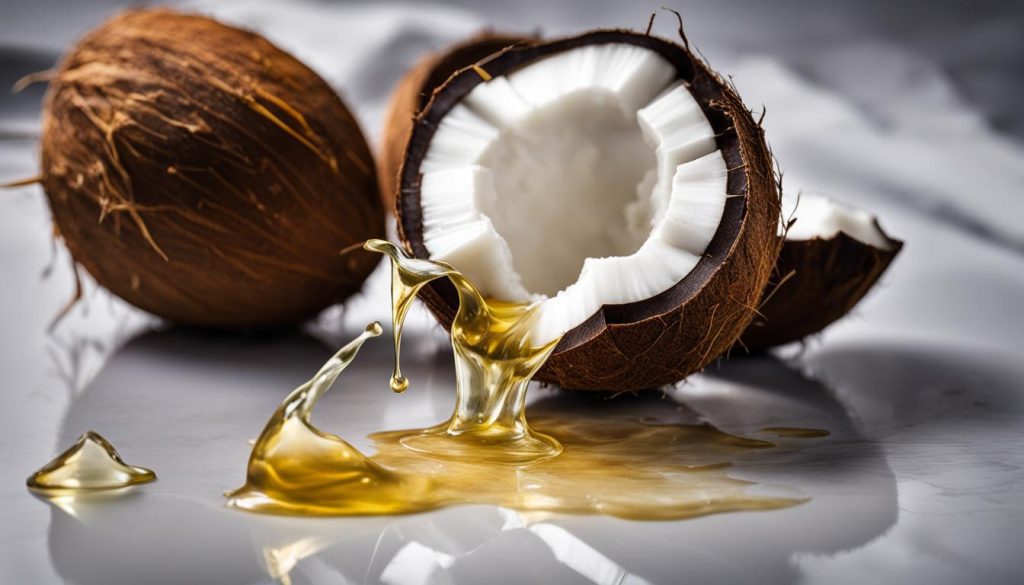Have you ever heard of oil pulling? It’s an ancient Ayurvedic practice that has been gaining popularity in recent years for its potential benefits on oral health. If you’re looking for a natural and simple technique to improve your oral hygiene, oil pulling might be worth considering.
Oil pulling involves swishing oil in your mouth for a certain period of time to remove bacteria, plaque, and debris. One of the most commonly used oils for this practice is coconut oil, thanks to its antimicrobial properties and high content of lauric acid.
Oral Hygiene Oil Pulling Technique
- Oil pulling is an ancient Ayurvedic practice that promotes oral health.
- Coconut oil is often used for oil pulling due to its antimicrobial properties.
- Oil pulling can help reduce plaque, improve gum health, and prevent cavities.
- Consistency is key when practicing oil pulling to reap the benefits.
- Incorporating oil pulling into your daily oral hygiene routine can contribute to better oral and systemic health.
Understanding Oil Pulling: A Time-Tested Practice for Oral and Systemic Health
Oil pulling, an ancient Ayurvedic practice, has regained popularity for its potential benefits on oral and overall health. This technique involves swishing oil in the mouth to remove plaque, bacteria, and cellular debris, creating a healthier oral environment. But the advantages of oil pulling go beyond the mouth, as good oral health is closely linked to overall well-being.
By enhancing the oral microbiome, oil pulling can have a positive impact on systemic health. The oral microbiome refers to the complex community of microorganisms that inhabit the mouth. When this microbiome is balanced, it can help maintain oral health and contribute to overall wellness.
Research suggests that disturbances in the oral microbiome could potentially lead to various health issues, such as cardiovascular disease, respiratory infections, and even cognitive decline. Therefore, taking care of the oral microbiome through practices like oil pulling could provide broader health benefits.
To better understand how oil pulling contributes to overall well-being, let’s delve into the science behind it.
The How-To of Oil Pulling
To practice oil pulling, follow these simple steps:
- Choose your oil: Take about one teaspoon to one tablespoon of coconut oil or another edible oil like sesame or sunflower oil. Coconut oil is often preferred for its composition and antimicrobial properties.
- Hold and swish: Put the oil in your mouth and hold it there. Swish the oil through your teeth, moving it around your mouth, for five to twenty minutes. Take your time and be gentle.
- Spit and rinse: Spit out the oil into a trash can or tissue. Avoid spitting it into the sink as it can clog the drain. After spitting, rinse your mouth thoroughly with water.
- Brush your teeth: Brush your teeth as you normally would, using toothpaste. Oil pulling is a complementary practice, not a substitute for regular brushing and flossing.
It’s recommended to perform oil pulling in the morning, before eating or drinking anything. The swishing action helps to stimulate the gums and loosen plaque, while the antimicrobial properties of the oil help to reduce harmful bacteria in the mouth.

Why Coconut Oil for Oil Pulling?
When it comes to oil pulling, coconut oil is the superstar. And there’s a good reason why it’s widely preferred for this oral hygiene technique. Coconut oil contains a special ingredient called lauric acid, which is a medium-chain saturated fat known for its potent antimicrobial effects.
Lauric acid acts as a powerful defender against disease-causing organisms by effectively destroying them. It has the ability to dissolve the protective envelope of viruses, bacteria, and parasites. This makes coconut oil an excellent choice for oil pulling, as it can help combat the harmful bacteria associated with cavities and gum inflammation.
In addition to its antimicrobial effects, coconut oil has also been found to be effective against Candida albicans yeast, which is commonly found in the mouth and can contribute to various oral health problems.
By using coconut oil during oil pulling, you can harness the natural benefits of lauric acid and enjoy the antimicrobial properties it offers. This can help create a healthier oral environment and support your overall oral health. Plus, coconut oil is easily accessible and affordable, making it a practical choice for incorporating oil pulling into your daily routine.
Scientific Evidence for Coconut Oil Pulling
Scientific research provides compelling evidence supporting the effectiveness of coconut oil pulling in improving oral health. Clinical trials have demonstrated its benefits in reducing oral bacteria, plaque formation, and gum inflammation.
One study compared the effectiveness of coconut oil pulling to that of an antimicrobial mouthwash in reducing oral bacteria associated with cavities. The results showed that coconut oil was just as effective as the mouthwash in reducing harmful bacteria, highlighting its antimicrobial properties.
In another study, researchers investigated the impact of coconut oil pulling on plaque formation and gum inflammation in adolescents with gingivitis. The study found that coconut oil pulling significantly reduced both plaque formation and gum inflammation, indicating its potential as a complementary therapy for maintaining oral health.
Coconut oil is favored for oil pulling due to its safety and lack of side effects compared to conventional mouthwashes. It provides a natural alternative that can be incorporated into daily oral care routines without concerns about harmful chemicals.
Benefits of Coconut Oil Pulling:
- Reduces oral bacteria linked to cavities
- Significantly reduces plaque formation
- Alleviates gum inflammation
- Offers a safe and natural alternative to chemical-laden mouthwashes
These scientific findings provide strong support for the efficacy and safety of coconut oil pulling as part of a comprehensive oral care routine. Incorporating coconut oil pulling into your daily routine can contribute to improved oral health and overall well-being.

Patience and Consistency
Results from oil pulling may vary from person to person, and some individuals may notice immediate improvements in their oral health, while others may require more time. Consistency with oil pulling is key to reaping its benefits. Incorporating oil pulling into a daily routine, along with regular brushing and flossing, can help maintain good oral health.
Oil pulling benefits can be experienced over time, and it is important to be patient with the process. While some individuals may see quick improvements in their oral health, such as fresher breath and reduced plaque, others may need to practice oil pulling regularly for a longer period to notice significant changes.
Consistency is key when it comes to oil pulling. Making it a part of your daily oral hygiene routine can help ensure that you achieve the desired results. Set a time each day to dedicate to oil pulling, whether it’s in the morning before brushing your teeth or in the evening before bed.
During oil pulling, remember to swish the oil gently and thoroughly through your teeth and gums, ensuring it reaches all the areas of your mouth. Aim for a duration of five to twenty minutes, gradually increasing the time as you become more comfortable with the practice.
By incorporating oil pulling into your daily routine, you can take advantage of its oral health benefits. Regular oil pulling can help reduce plaque, fight bacteria, promote healthier gums, and contribute to overall oral hygiene.
Conclusion
Incorporating oil pulling into your oral health routine can have significant benefits for your overall oral and systemic health. This time-tested technique, particularly when using natural coconut oil, can help enhance your oral microbiome, reduce plaque, and alleviate gum inflammation. By making oil pulling a part of your daily routine, you can support better oral health naturally.
Oil pulling offers a simple and effective way to maintain oral hygiene. With its antimicrobial properties and ability to remove toxins and debris from the mouth, oil pulling can contribute to a healthier mouth and fresher breath. By swishing coconut oil in your mouth for a few minutes each day, you can potentially prevent cavities, improve gum health, and support your overall well-being.
So why not try adding oil pulling to your natural oral care routine? Alongside regular brushing and flossing, oil pulling can be a valuable addition to maintaining a clean and healthy mouth. It’s a simple practice that has been passed down for generations and offers a holistic approach to oral care.
FAQ
What is oil pulling?
Oil pulling is an ancient Ayurvedic practice that involves swishing oil in the mouth to promote oral health.
What are the benefits of oil pulling?
Oil pulling can help reduce plaque, improve gum health, and prevent cavities.
How do I oil pull?
Take about one teaspoon to one tablespoon of coconut oil or another edible oil and swish it in your mouth for five to twenty minutes before brushing your teeth in the morning.
Why is coconut oil preferred for oil pulling?
Coconut oil is often preferred for oil pulling due to its antimicrobial properties and high content of lauric acid.
Is there scientific evidence to support coconut oil pulling?
Yes, several studies have shown the efficacy of coconut oil pulling in reducing oral bacteria, plaque formation, and gum inflammation.
How long does it take to see results from oil pulling?
Results may vary, but consistency with oil pulling is key. Some individuals may notice immediate improvements, while others may take more time.
Can oil pulling be part of a daily oral care routine?
Yes, incorporating oil pulling, along with regular brushing and flossing, can help maintain good oral health.




